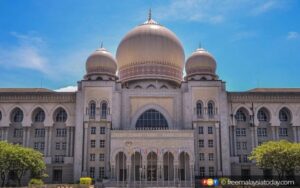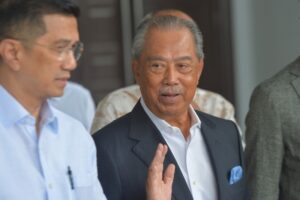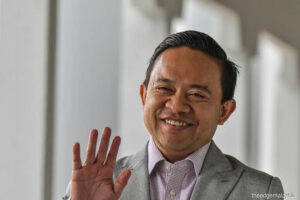By The Malaysian Bar

The chairman of Human Rights Committee of the Bar Council, Edmund Bon was released on RM1,000 bail after being charged at the Kuala Lumpur Sessions Court today for obstructing a Kuala Lumpur City Hall officer from bringing down a banner at the Bar Council premises. He claimed trial.
The other four lawyers, Human Rights Committee deputy chairman Amer Hamzah Arshad, Latheefa Beebi Koya, K. Sivarasiah, and N. Surendran together with four other — Eric Paulsen, Nooraza Othman, Johny Anbu @ Abu Bakar Adnan and Ashraf Sadakathullah were charged for participating in an illegal assembly, but were released on RM2,000 bail.
The case is heard before Sessions Court judge S.M. Komathy who fixed Jan 28 to 31 to hear the charges against the eight whilst Bon’s case will be tried from March 3 to 5.
Earlier, the entire Bar was kept apprised of the proceedings in court by minute-to-minute real-time reporting by the Web Reporter via emails. Below are the emails sent to the members, and they may contain errors because they were done contemporaneously.
11.00am
Hundreds of lawyers at court to lend support
As the traffic to our Bar Website is extremely heavy, I will have to update you via emails.
At the time of writing this email, about 400 lawyers have gathered at the Jalan Duta Magistrate’s Court since early this morning but there is still no sight of the Chair of Human Rights Committee, Edmund Bon and the other four lawyers.
I understand they were taken to the court from the lock–up as early as 6.30am. It now appears that it is likely they will only be charged in the afternoon when the crowd is smaller.
The President of the Malaysian Bar, Ambiga Sreenevasan has urged members to go to the court to lend support to our detained colleagues.
Meanwhile, the Bar Council will be holding an emergency meeting this afternoon to decide whether to take KL Datuk Bandar and his officers to court for having trespassed onto our property and forcibly removed some human rights banners and placards from our premises.
1.05pm
The chair of the Human Rights Committee, Edmund Bon, his deputy, Amer Hamzah, and 3 other lawyers, Sivarasa, Surendran, and Latefa Koya are now being charged in Session Court No 1, Kuala Lumpur.
About 300 lawyers are here and the court room is fully packed with lawyers and pressmen. When they appeared, lawyers present and applauded them.
Edmund pleaded not guilty to a charge for obstructing DBKL officers in the execution of their duties under section186 of the Penal Code which reads:
Whoever voluntarily obstructs any public servant in the discharge of his public functions, shall be punished with imprisonment for a term which may extend to two years, or with fine which may extend to ten thousand ringgit, or with both.
Edmund is represented by Srikant Pillay, Richard Wee, Saha Deva, Bernard Francis, and Brenda Silva. Amer, Sivarasa, Surendran, and Koya are represented by P. Valen, Ragunath Kesavan, and Tommy Thomas.
Attorney General Tan Sri Gani Patail is prosecuting together with Datuk Yusof and Raja Rozila. The case is heard before Sessions Court judge SM Komathy Suppiah.
At the time of writing this email, the charges are being read to the accused.
More news to follow shortly.
1.17 pm
Deputy Human Rights chair, Amer Hamzah charged too
Amer Hamzah, the Human Rights Committee deputy chair, has been charged under sections 27(5)(a) and s 27(4) of the Police Act punishable under section 27(8) and sections 143 and 154 of the Penal Code.
Sivarasa, Surendran, and Koya are similarly charged and all have pleaded not guilty.
The provisions read as follows:
Section 145
Whoever joins or continues in an unlawful assembly, knowing that such unlawful assembly has been commanded in the manner prescribed by law to disperse, shall be punished with imprisonment for a term which may extend to two years, or with fine, or with both.
Section 143
Whoever is a member of an unlawful assembly, shall be punished with imprisonment for a term which may extend to six months, or with fine, or with both.
Section 27. Power to regulate assemblies, meetings and processions.
(1) Any Officer in Charge of a Police District or any police officer duly authorized in writing by him may direct, in such manner as he may deem fit, the conduct in public places in such Police District of all assemblies, meetings and processions, whether of persons or of vehicles and may prescribe the route by, and the time at, which such assemblies or meetings may be held or such procession may pass.
(2) Any person intending to convene or collect any assembly or meeting or to form a procession in any public place aforesaid, shall before convening, collecting or forming such assembly, meeting or procession make to the Officer in Charge of the Police District in which such assembly, meeting or procession is to be held an application for a licence in that behalf, and if such police officer is satisfied that the assembly, meeting or procession is not likely to be prejudicial to the interest of the security of Malaysia or any part thereof or to excite a disturbance of the peace, he shall issue a licence in such form as may be prescribed specifying the name of the licensee and defining the conditions upon which such assembly, meeting or procession is permitted:Provided that such police officer may at any time on any ground for which the issue of a licence under this subsection may be refused, cancel such licence.
(2A) An application for a licence under subsection (2) shall be made by an organization or jointly by three individuals.
(2B) Where an application is made jointly by three individuals, the police officer to whom the application is made shall refuse the application if he is satisfied that the assembly, meeting or procession for which a licence is applied is in actual fact intended to be convened, collected or formed by an organization.
(2C) Where an application is made jointly by three individuals, the police officer issuing the licence shall specify in the licence the names of those persons as licensees.
(2D) No licence shall be issued under subsection (2) on the application of an organization which is not registered or otherwise recognized under any law in force in Malaysia.
(3) Any police officer may stop any assembly, meeting or procession in respect of which a licence has not been issued or having been issued was subsequently cancelled under subsection (2) or which contravenes any of the conditions of any licence issued in respect thereof under that subsection; and any such police officer may order the persons comprising such assembly, meeting or procession to disperse.
(4) Any person who disobeys any order given under subsection (1) or subsection (3) shall be guilty of an offence.
(4A) Where any condition of a licence issued under subsection (2) is contravened, the licensees shall be guilty of an offence.
(5) Any assembly, meeting or procession–
(a) which takes place without a licence issued under subsection (2); or
(b) in which three or more persons taking part neglect or refuse to obey any order given under subsection (1) or subsection (3),
shall be deemed to be an unlawful assembly, and all persons attending, found at or taking part in such assembly, meeting or procession and, in the case of an assembly, meeting or procession for which no licence has been issued, all persons attending, found at or taking part or concerned in convening, collecting or directing such assembly, meeting or procession, shall be guilty of an offence.
(5A) In any prosecution for an offence under subsection (5) of attending, being found at or taking part in an assembly, meeting or procession which is an unlawful assembly, it shall not be a defence that the person charged did not know that the assembly, meeting or procession was an unlawful assembly or did not know of the facts or circumstances which made the assembly, meeting or procession an unlawful assembly.
(5B) In any prosecution for an offence under subsection (5) of attending or being found at an assembly, meeting or procession which is an unlawful assembly, it shall be a defence that the presence of the person charged came about through innocent circumstances and that he had no intention to be otherwise associated with the assembly, meeting or procession.
(5C) For the purposes of subsection (5), where it appears from all the circumstances relating to an assembly, meeting or procession that it was convened, collected or directed by or with the involvement, participation, aid, encouragement, support or connivance of an organization, every member of the governing body of the organization shall be deemed to have taken part or been concerned in convening, collecting or directing the assembly, meeting or procession unless he proves that he did not know nor had any reason to believe or suspect that the assembly, meeting or procession was going to take place or, if he knew or had reason to believe or suspect as aforesaid, he had taken all reasonable steps to prevent the assembly, meeting or procession from taking place or, if it was not reasonably within his power to so prevent, he had publicly objected to or dissociated himself from the convening, collecting or directing of the assembly, meeting or procession.
(6) Any police officer may, without warrant, arrest any person reasonably suspected of committing any offence under this section.
(7) Any person aggrieved by the refusal of the Officer in Charge of a Police District to issue a licence under subsection (2) may within forty–eight hours of such refusal appeal in writing to the Commissioner or Chief Police Officer; and the decision of the said Commissioner or Chief Police Officer thereon shall be final.
(8) Any person who is guilty of an offence under this section shall be liable on conviction to a fine of not less than two thousand ringgit and not more than ten thousand ringgit and imprisonment for a term not exceeding one year.
(8A) Sections 173A and 294 of the Criminal Procedure Code [Act 593] shall not apply in respect of an offence under this section.
1.55pm
Edmund Bon complains of injuries
The chairman of Human Rights Committee, Edmund Bon asked the court to record the injuries he sustained on his arms when he was arrested by DBKL officers.
When the AG was asked by the Judge whether he would oppose bail, Tan Sri Gani replied in the affirmative and immediately lawyers in public gallery sighed loudly.
Bon’s counsel, Sri Kanth Pillay is now submitting why his client ought to be granted bail. Pillay said his client is no threat to national security. He added that his client was merely protecting Bar Council’s property. Neither will Bon be tampering with any evidence or interfering with DBKL officers.
Pillay said section 186 is not a serious offence, and the bail amount should not be put too high to punish the accused.
He asked the bail to be fixed at RM500 with one surety.
Bon’s other counsel, Bernard Francis now submits.
As my laptop battery is running low, full report will be given later on the website.
2.08 pm
AG opposes Edmund’s bail application
I am back after I managed to find a power point.
The court is back after 10 minutes recess.
Earlier, Edmund’s counsel Sreekant Pillai and Edmund Francis submitted on why bail ought to be granted. Then shortly before the recess, another of Edmund’s counsel, Richard Wee spoke of Edmund’s good character and family background and that his parents are also in court. Just before the judge went into her chambers, she asked: “Isn’t Edmund a habitual latecomer to court? and the public gallery broke into laughter.
The AG now replies. Tan Sri Gani said he agrees that Edmund is no threat directly as a person. He also agrees that bail is not to punish a person. Edmund, the AG said, is also his friend and he knows Edmund well who is a learned person.
He went on to say that the first issue is whether bail should be granted or not and quantum is only the next step.
AG said he is now looking at the larger interest of the public. He added that section 186 is not bailable and non–compoundable because of the seriousness of the offence.
2.20pm
Judge stands the matter down for 5 mins
AG said this is a clear case of obstructing a public officer.
Tan Sri Gani argued that if Edmund feels that DBKL has extended his powers, then the latter should take DBKL to court. He added that if anyone can disobey a public officer, then there will be anarchy which statement drew laughter from everyone present.
Tan Sri Gani said even if bail is granted, there should be conditions attached. Judge Komathy Suppiah then asked the AG if she was minded to grant bail, what would be the conditions that the AG would be asking.
Tan Sri Gani replied perhaps the matter should be dealt with after hearing all the cases and immediately the crowd roared in disapproval.
Judge Komathy then stood the matter down for 5 minutes for AG to confer with Edmund’s counsel.
2.45pm
Judge to decide on Edmund’s application after hearing the other applications
When court resumed, the AG said if the judge was minded to grant bail, then the judge should set conditions in line with the case of PP v. Dato’ Mak.
Tan Sri Gani then said the condition should be that Edmund would not obstruct any public officer in the performance of his duty.
Edmund’s counsel Sreekant Pillay then objected to the condition.
The judge then ruled that she would decide after hearing the others’ applications.
The case now proceeds with applications for bail by the other accused.
At the request of counsel P. Valen, the AG is now giving a summary of his grounds against the bail application.
Meanwhile, the court room is still packed with about 200 lawyers with little room to move for everyone.
3.22pm
Judge allows bail, court now hears arguments on quantum
In reply, P. Valen asked the AG why is he taking an inconsistent stand when he did not even object to any bail application or ask any condition to bail in the Altantuya murder trial.
He went on to say that to refuse bail would be tantamount to punishing an accused before conviction and to send a message to society that unlawful assembly attracts preventive detention.
Ragunath Kesavan then submitted that the burden is upon AG to show why bail ought to be refused. Even in ISA cases, some form of evidence must be afforded to the court as there is no averment before the court that the 8 accused will be involved in further unlawful assembly.
Tommy Thomas argues that when deciding whether to allow bail or not, one should look at the Federal Constitution. Article 4(1) recognises the supremacy of the Constitution, and therefore the Penal Code and Police Act are subordinate to the Constitution. So, when discretion is exercised, the Constitution must be taken into account.
Fundamental liberties start from Articles 5–12. Art 5(1) says liberty of person should be upheld in accordance with law. Article 10(1)(a) refers to freedom of expression and Article 10(1)(b) refers to peaceful assembly. The words used are “peaceful assembly” and these are constitutionally enshrined subject to restrictions to Article 10(2) which are the security of Malaysia and public order.
Therefore, the burden is on the prosecution to show how security of Malaysia is threatened when 100 people assembled outside SOGO and walked about 400 yards and further if they are released on bail, how is the security of Malaysia will be worsened by granting the bail.
Tommy went on to say when court interprets fundamental liberties in Nordin Salleh v. Dewan Undangan Kelantan, it says when testing the validity of state action, the court is required to look at the state action. Nordin Salleh says the court must look at the effect and consequence of the state action which is bail application. So, the effect would be personal liberty and Nordin Salleh compels the court to look at it.
With regard to the words “in accordance with law”, Tommy says section143 which provides: “Whoever is a member of an unlawful assembly, shall be punished with imprisonment for a term which may extend to six months, or with fine, or with both.”
From these words, the trial court is not obliged to imprison an accused. It is not mandatory imprisonment, and it will be a great injustice if someone who is not found guilty or fined, he is imprisoned.
Tommy submits these constitutional provisions should be taken into account whether to grant any bail.
AG then replied that if one follows Tommy’s argument, then there is no issue even about arresting any person for simple reason that there is a likelihood of him being acquitted.
The issue is whether the judge to grant bail that is when refusing bail the nature of the offence will be continued or repeated.
AG argued that this is not a case of lawyers celebrating Human Rights Day and one would know just by looking at the names and this statement drew disapproval sounds from the lawyers present.
The judge then asked whether there is evidence to suggest that the 8 accused would repeat the offence. By looking at the names, the judge surmised that probably the only notorious name is R Sivarasa and then lawyers present clapped in response. The AG replied that that he was not able to guarantee that they would not repeat the offence. Again, this statement drew loud disapproval from the public gallery and the judge threatened to instruct the police to clear the gallery if those present did not keep quiet.
The judge further asked the AG whether he had any reasonable grounds to believe that they would repeat the act. Tan Sri Gani argued that despite all the warnings, they went ahead. Further, Tan Sri AG argued that no one was prevented by the police to enter the Bar Auditorium for the Human Rights celebrations.
In reply, P. Valen submitted that AG should just charge them in court instead of opposing the bail applications.
After hearing all the submissions, the Judge said she would not accept the AG’s arguments and would grant bail.
The court now hears arguments on the quantum.
*Please note that we do not have time to edit the report, and it may contain typos and errors.
3.52pm
4 lawyers released on RM2,000 bond while Edmund released on RM1,000 bond
The AG said he is not asking much, but to obey the law, that is, not to defy any public order from the police or public officer.
In reply, Tommy said it is totally impracticable for example if tomorrow they are stopped at traffic lights or they defy the Income Tax order. Tommy said this is too wide.
AG then replied that he is very kind as his request is only not to defy the police order to disperse in any assembly until disposal of the case.
Ragunath Kesavan went on to say it has to be more specific with the main purpose of ensuring attendance in court.
Judge then asked the AG whether he has any precedent for this as the usual conditions are for example like reporting to the police station once a week. AG asked if he has any authorities, but AG said off hand he does not have but he can refer to the provisions in the CPC.
AG gave example of section 66 asking for bond for good behaviour. which reads:
(1) Whenever any person is convicted –
(a) of any offence which involves a breach of the peace or of abetting the same; or
(b) of committing criminal intimidation or criminal trespass or of being a member of an unlawful assembly, and the Court before which the person is convicted is of opinion that it is necessary to require that person to execute a bond for keeping the peace, the Court may, at the time of passing sentence on that person or in lieu of any sentence, order him to execute a bond for a sum proportionate to his means with or without sureties for keeping the peace during such period in each instance as it thinks fit to fix, not exceeding six months if the order is by a Magistrate’s Court or two years if the order is by the High Court.
(2) If the conviction is set aside on appeal or otherwise the bond so executed shall be void.
Judge asked if anyone could assist the court in raising personal bond. P. Valen then tried to explain. At this juncture, Richard Wee said if the judge was minded in imposing an amount, she could decide soon as the bank downstairs would close.
P. Valen then asked for RM1,000, but the judge fixed bail at RM2,000.
As regards Edmund Bon’s bail, the judge fixed the amount at RM1,000.
AG then rose and added in jest that may his friend, Edmund Bon do come in court in time in future.
Source: https://www.malaysianbar.org.my/article/news/bar-news/news/edmund-bon-and-4-other-lawyers-released-on-bail. Archived at https://perma.cc/KN9V-AZY2.



